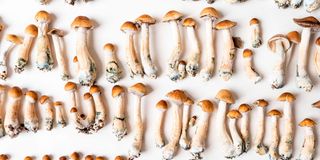
Over the past three years there has been a 45 percent rise in the use of psychedelics and prescription drugs like magic mushrooms.
Two years ago, Kevin Mwendwa, a 25-year-old, was introduced to “shrooms,” a colloquial term for magic mushrooms.
A friend suggested that these mushrooms were “extremely fun compared to other substances like alcohol and bhang,” and Kevin was curious to try them.
Magic mushrooms, or shrooms, are typically dried and brownish, with users preferring them dry as they are less likely to cause stomach discomfort.
Kevin, a software engineer, says, “With the shroom highness, you feel very euphoric.”
It is this search for a euphoric high that is worming its way through Kenyan culture, pushing the use of the magic mushrooms which are psychedelic. Psychedelics are drugs that alter a person’s perception of reality and cause them to see or hear things that do not exist or are distorted.
The users of shrooms? Young people, or GenZs calling themselves free thinkers, and people in the creative industry, such as artistes, seek something that can trigger “self-discovery, creativity, healing, and spiritual growth.”
A 2023 report by the United Nations Office on Drugs and Crime highlighted a 45 percent rise in the use of psychedelics and prescription drugs like LSD, magic mushrooms, and DMT in Kenya over the past three years.
Dr Pius Kigamwa, a senior lecturer in the Department of Psychiatry at the University of Nairobi with nearly four decades of experience, explains the mechanism behind these experiences: “The mushrooms cause increased serotonin transmission in the brain. Serotonin is one of the happy hormones. And when you have excess transmission across the serotonin receptors, then you do get into a state of dissociation, extreme euphoria, and loss of reality.”
Psilocybin, the active compound in “magic mushrooms,” is known for its hallucinogenic properties. The young Kenyans often describe entering a “dimensional realm” - a state of altered consciousness that can include vivid visual and auditory hallucinations, changes in perception, and a sense of expanded awareness.
Sylvia Mita, a clinical psychologist and founder of Live Springs Psychotherapy in Nairobi, notes that the hype around psychedelics is influenced by global trends and social media.

The clinical psychologist with 10 years of experience says, “There's a lot of hype all over the world surrounding the use of mushrooms and other psychedelics such as LSD and MDMA. Kenyans are getting influenced by social media and a generally popular culture. But according to the Poisons and Pharmacy Board in Kenya, it is illegal to use such drugs.”
Sh1,800 a gramme
Shrooms are not without their risks. Side effects can include nausea, increased sweating, tremors, anxiety, paranoia, and mood swings. So why are young Kenyans using them?
Kevin, who describes himself as not a drug enthusiast, says he used it because he wanted to be hypnotized.
“I was advised to start with one gramme or even half a gramme. On the day I decided to try, I made sure I hadn't eaten for about three hours before. They cost me about Sh1,800 per gramme. I took one gramme with an orange wedge to mask the woody taste. After about 30 to 40 minutes, it started kicking in,” he says.
“Everything around me started changing. The world became brighter, more colourful, and warmer. I felt this incredible warmth inside. It wasn't like I was in another dimension, but everything was just more vibrant and interesting.”
The high, Kevin says, lasted two to three hours as a first-timer, and in that trance, “Time seemed to stretch and compress in weird ways. For those few hours, I was in a state of euphoria.”
The fleeting happiness was followed by a thirsty spell that left his throat parched, and on subsequent uses, he had to stay hydrated. Since that first time, the 25-year-old says he uses shrooms maybe once or twice a month, but “it is not something he craves all the time."
Kevin and his friend have explored other psychedelics too - LSD, molly, MDMA. “But shrooms” he argues, “are natural, less addictive.”
Enhanced creativity or spiritual experiences
Dr Kigamwa observes a broader trend: “There’s a lot of experimenting going on now amongst young people who may have tried things like LSD, MDMA, ecstasy and so on and want to experience a different sort of high. We know that a lot of these recreational drugs are now becoming a problem even here in Nairobi."

Some are drawn to the promise of enhanced creativity or spiritual experiences, while others are curious about potential therapeutic benefits, especially for conditions like depression, anxiety, and PTSD.
However, this interest often outpaces scientific understanding.
“The public is ahead of research,” Ms Mita observes, highlighting the gap between popular enthusiasm and rigorous scientific study.
Gather to eat shrooms
Another user, an artiste based in Mombasa who prefers to remain anonymous, shares that shrooms provide unique experiences for different people. “You can’t just take them for recreation, he says. “It’s a deep dive into the subconscious—the things you don't actively think about but are within you.”
In Mombasa, they sometimes meet with other users to eat the fungi.
The consumption methods vary. “You have to ingest them, you cannot smoke them. I like to put it with a piece of chocolate or a snack. It helps with the taste. Some people would boil it into tea.”
“It’s not something that you can just take for recreation,” he says. "Most of the time, it’s for a more personal experience. It's a deep dive into consciousness, specifically subconsciousness—the things that you don't think about actively that are within you.”
Since psilocybin mushrooms are illegal in Kenya, users rely on word-of-mouth and trusted connections to source them. The shroom community has also developed its harm reduction practices, advising each other about "set and setting" - being in the right mindset and environment for a psychedelic experience.
“For beginners, if you take a high dose on your first time, you're susceptible to having a bad trip,” he says.
The “trip” means how various grammes of shrooms take one to different realms where they experience different things. The effects of a psilocybin trip typically last six to seven hours, during which users report a range of experiences, from euphoria to profound introspection. Some describe feeling as if they are accessing different dimensions of reality, particularly at higher doses.
“Six grammes and up, what you call a hero’s dose, puts you in an alternate state,” the source explains. “You feel like you're experiencing the universe from a different perspective, like you're no longer bound to 3D space.”
Case studies
The risks associated with uncontrolled use are significant. Ms Mita, the clinical psychologist, recounts a cautionary tale from her practice.
“I’ve had a patient before, who took psilocybin mushrooms, and he was like, 'I want to fly,' because the hallucinations were telling him that he can fly. He actually jumped. One can end up dying, but luckily he survived.”
Dr Kigamwa provides a comprehensive list of potential side effects: “When you consume them, you may experience nausea, vomiting, bodily weakness, and muscle weakness. You might have problems with coordination, hallucinations, or visual hallucinations. From a psychological perspective, they may cause dissociation, where an individual may not be able to tell what is real and what is fantasy. And then, in extreme cases, they may cause psychosis. In overdose, the mushrooms have been known to cause death.”
Other risks include exacerbation of underlying mental health conditions, impaired judgment leading to risky behaviours, and the potential for psychological distress or “bad trips.”
Dr Kigamwa shares his clinical experience: “What I do know, through my experience with my patients, is that these trips are dangerous. Some users have, frankly, had very bad trips. They became psychotic and have sworn to never use shrooms.”
Research landscape
On the flip side, emerging research suggests potential therapeutic applications for psilocybin. Dr Kigamwa notes, “They have been used to help individuals with depression, especially treatment-resistant depression. They have been successfully used to treat individuals with post-traumatic stress disorder. People with headaches also benefit from mushrooms.”
However, both experts emphasize that such use would need to occur in controlled, clinical settings - a far cry from recreational experimentation. As Dr Kigamwa points out, “So far, because of the negative effects and not enough information on what formulations exist of it and what would be the dosages of this thing, they are not yet Food and Drug Administration (FDA) approved for management of all these conditions.”
Psilocybin mushrooms are illegal in Kenya, making it challenging for researchers to explore their potential benefits or risks.
“There is interest. However, there hasn't been much research that has started, because the legal aspect poses challenges - questions around how the research would be conducted, who it would be done on, and in what controlled environment,” says Dr Mita who is currently pursuing her Doctor of Psychology in Clinical Psychology.







